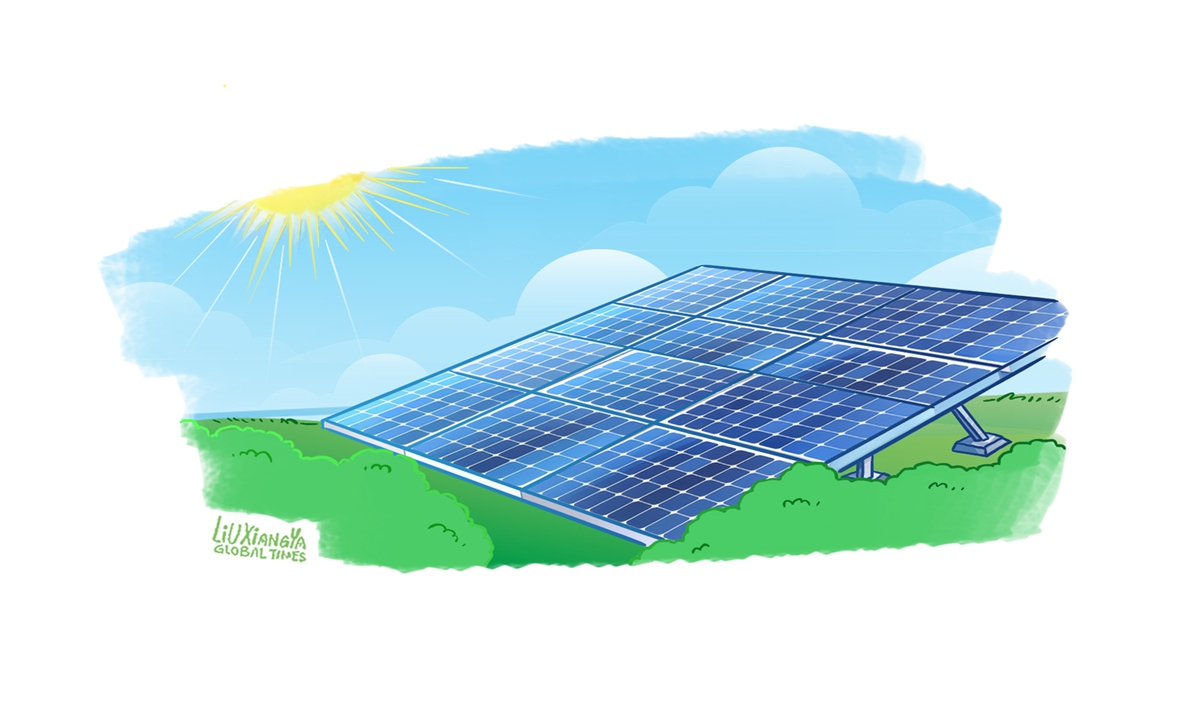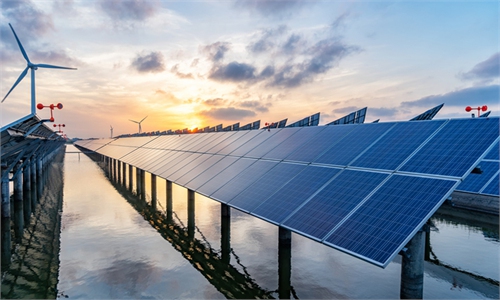US dilemma on PV tariffs reveals Chinese manufacturing’s integral role in global supply chain

Illustration: Liu Xiangya/GT
The Biden administration is mulling exempting Mexico from tariffs on imported solar equipment, a change that could benefit global solar panel maker Maxeon Solar Technologies, which is majority-owned by China's TCL Zhonghuan Renewable Energy Technology Co, Bloomberg News reported.The consideration of tariff exemptions exposes that the high tariff policy in the US is counterproductive to boosting the domestic solar panel manufacturing industry. Maxeon's case shows that Chinese manufacturing is involved in almost every aspect of the global supply chain. It is unfeasible for the US to exclude Chinese manufacturing for political reasons.
Evidently, the US' industrial policies regarding photovoltaics (PV) and other sectors have fallen into a contradictory and chaotic situation. The approach of using tariff barriers to protect domestic industries, along with subsidies to support domestic industries, appears to be deeply embroiled in controversy.
On the one hand, opponents of the possible tariff exemption argue the change would put those US producers at an unfair disadvantage to a foreign, Chinese-backed competitor. On the other hand, some US module manufacturers reliant on imported components say that the tariffs will penalize US panel makers reliant on foreign supplies, according to Bloomberg.
The intense debates and arguments regarding trade barriers and restrictive measures are prevalent across various other industries in the US. Different sectors are grappling with similar dilemmas, highlighting the negative impact of these trade policies on the overall economy and business operations in the US.
Take the US semiconductor export controls for example. They are a double-edged sword. In limiting foreign semiconductor capabilities, Washington also limits its own, according to an article titled "Why US Semiconductor Export Controls Backfire" published by the Diplomat in May.
In the photovoltaic sector, the US continues to go further down the wrong path of increasing tariffs, while also considering tariff exemptions in response to requests from some domestic companies that have been harmed. On November 29, US trade officials set preliminary tariffs on solar cells from the four main export countries in Southeast Asia. In less than a month, there are reports of the US government mulling exempting Mexico from tariffs on imported solar equipment. This is quite ironic.
High tariffs and other trade barriers impose restrictions on the development of domestic industries in the US rather than providing boosts. What continues to push the US further on the wrong track of trade restrictions and barriers are political reasons intended to exclude China from supply chain cooperation and contain the development of China's industries.
China's solar panel manufacturing plays a dominant role in global solar supply. Some US anti-China politicians have concocted the "overcapacity" narrative to smear China's normal and legitimate industrial development. Yet, the US' ambition to boost its own solar panel manufacturing industry cannot bypass cooperation with the global supply chain with China as a key link.
In fact, the influence of Chinese manufacturing extends far beyond just photovoltaic products. It has expanded to almost all other sectors as well. For instance, mid-range chips, automotive parts and communication devices, are closely tied to Chinese manufacturing.
The production and supply chains of these products are nearly inseparable from China's involvement. Chinese manufacturing has become an integral part of every segment of the global industrial chain. The idea that the US can completely eliminate Chinese manufacturing is quite unrealistic, as China holds a significant position in many critical areas.
The US mulling exempting Mexico from solar panel tariffs further demonstrates that all parties intertwined in global supply chain cooperation benefit from cooperation formed by market rules.
Washington may encounter growing challenges in its attempts to exclude China from global industrial chain. As the global economy evolves, the advantages of Chinese manufacturing are likely to become increasingly prominent, positioning the country as a key player in the transformation of global supply chains.
The author is a reporter with the Global Times. bizopinion@globaltimes.com.cn



